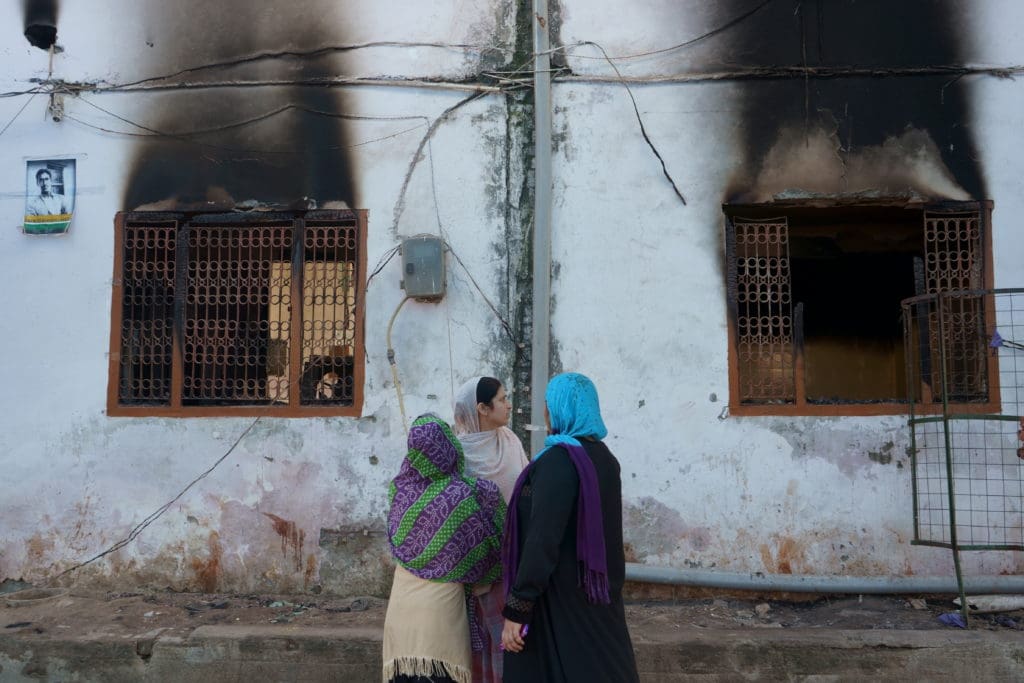Tensions rise in India as the Karnataka state officials seek to ban women from wearing the hijab in schools.
A video posted online showing a hijab-wearing Muslim woman being mobed by Hindu far-right nationalists has sparked outrage as tensions mount in the southern Indian state Karnataka.
Muskan Khan is filmed seeking to enter the school with saffron-clad young Hindu men heckling and seeking to prevent her from entering the school.
The right-wing mob can be heard in the video shouting the slogan ‘Jai Shri Ram’ (Hail Lord Ram), one of the most widely worshipped Hindu deities. In response, a lone Muslim student fighting for her rights chants back ‘Allah Akbar’ (God is great).
The latest tensions follow weeks of protests by six teenage students seeking to defend their right to get an education while wearing the hijab.
Now there are allegations that the pre-university admission forms of all six students were leaked by the college which has exposed the girl’s home address, telephone numbers, and emails – in a bid to intimidate the women into silence.
“The students can’t be asked to choose between their right to education and right to #hijab because both are the rights guaranteed under the constitution, and they are entitled to them,” said a women’s rights activist in India.
The controversy has even angered many Indians from the majority Hindu faith.
As tensions have mounted in the state, Chief Minister Basavaraj Bommai, from the Hindu nationalist Bharatiya Janata Party (BJP), has shuttered several schools.
In response to the protests, India’s education minister B C Nagesh said that the protesting Muslim women should be grateful that “Indian culture has given women a respectable position.”
Another colour got added to ongoing #HijabisOurRight row. #Dalit students wearing #blueshawls chanting #JaiBhim came in support of #Hijab wearing girl students at IDSG college #Chikkamagalur #Karnataka. pic.twitter.com/07yZEePExr
— Imran Khan (@KeypadGuerilla) February 7, 2022
A recent government order that students will have to wear the dress chosen by the college has been viewed by some as a stealth attempt to ban Muslim women from wearing the headscarf.
One Indian politician opposed to the right-wing policies being imposed by the BJP said that “the idea of India is about Tolerance, Equality and Unity. Educational institutions should be a centre hub for teaching those values.”
One local Muslim activist accused the Indian government of seeking to manipulate the issues as a means of deepening social cleavages.
“Its not About Force, its All About our Rights, It was our lone fight for our rights,” said the activist.
Another critic urged the international community to condemn the divisive far-right politics being pursued by Prime Minister Narendra Modi.
“Strongly condemn Modi’s #Hindutva driven religious apartheid against Muslim women students barred from wearing #hijabs. Clear discrimination that disproportionally affects Muslims only, fuelling #Islamophobia under garb of Hindu nationalism,” he said.
Strongly condemn Modi’s #Hindutva driven religious apartheid against MuslimWomen students barred from wearing #hijabs.Clear discrimination that disproportionally affects Muslims only, fuelling #Islamophobia under garb of Hindu nationalism. Intl comm must act. @UN #HijabisOurRight pic.twitter.com/7PTjc7ttgd
— Mohammad Sarwar (@ChMSarwar) February 8, 2022
The US, however, considers India a democratic partner against China – even as New Dehli pursues policies that some have said is creating the atmosphere for genocide against Muslims.
As protests have now spread across India, there is no sign that Modi will face a political cost for his anti-Muslim policies. Internationally, however, he joins an increasingly long list of leaders who are implementing anti-Muslim policies.
On Tuesday, Nobel Prize-winner Malala Yousafzai called on Indian leaders to do to “stop the marginalisation of Muslim women”.
“Refusing to let girls go to school in their hijabs is horrifying,” the 24-year-old activist tweeted.
Last week videos on social media emerged of Muslim women having the school gates shut in their faces as they attempted to enter the school.
Scenes of young female students crying and pleading with the school to allow them to enter the premises with months to go before exams that could decide their future went viral – sparking mass protests and wider support.
“The young Muslim women students in Karnataka have demonstrated great courage under extreme provocation from Hindutva mobs,” said one Indian politician adding that the “State has been complicit in this evil behaviour.”
Teacher and classmates escorted Muslim students safely out of the college. #KarnatakaHijabRow pic.twitter.com/aNKp3AzkKF
— Mohammed Zubair (@zoo_bear) February 8, 2022
Modi’s election in 2014 has emboldened Hindu supremacists who see India as a Hindu nation and seeks to marginalise the country’s 200 million-strong minority Muslim community.
This story first appeared on trtworld.com





